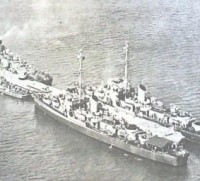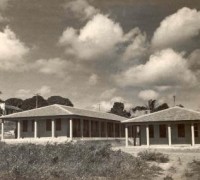BRAZILIAN NAVY NORTHEAST NAVAL FORCE * - NORTHEAST NAVAL FORCE IN ACTION
1)STATE OF BELLIGERANCE
Although until July 1942 there were thirteen Brazilian ships sunk by the Axis, the aggressions that occurred between August 15th and 17th, in a total of five, had a profound and decisive influence on public opinion, where it began to exert strong pressure on the government to respond to aggression. Until then, the attacks against Brazilian ships had been carried out above the 5th parallel, outside, therefore, of our territorial waters; the first occurred on the coast of the USA, and the rest, in the Caribbean or the Atlantic. Thus, in mid-42, u-boats started to operate in the south of Equator, along the Brazilian coast. Although not all of the attackers had been identified, it was concluded that the vast majority had been deployed by the Germans and that a small portion was left to the Italians.
In May 42, as Adm. Doenitz had already a greater number of submarines, He considered the moment to start a campaign against Brazil, and on the 16th of the same month, according to the Naval High Command, he issued orders to all merchant ships of the South American nations must be attacked, admittedly armed, with the exception of Argentine and Chilean flags. He was fully aware that his subordinates had already sunk 7 Brazilian ships; but he justified them on the grounds that their captains were not able to recognize the neutral identity of such boats, in addition to those that Brazilian merchants sailed in zig zag, many already armed, painted gray and without a flag or other sign of nationality.
And so, on July 4, after a conference with Hitler and Adm. Raeder held at the end of June, the sentence was passed, giving permission for the Brazilian merchants to be attacked. In June, when the operations to be carried out in the South Atlantic area were being studied in the Uboat High Command, Admiral Doenitz consulted the Ministry of Foreign Affairs if there was any objection to expanding the planning operations to the estuary of the Rio da Prata where he could certainly take a large number of English refrigerated ships, which went to Argentina and Uruguay to get meat. Minister Ribbentrop denied this permission, disapproving any operation in this area, however he did not raise objections for those planned on the shores of Brazil. For this reason, Adm. Doenitz had hands free for action in his own way.


